In a defiant challenge to the United States, President Ebrahim Raisi flew to three Latin American countries—one only 90 miles from the U.S. border—to deepen Iran’s strategic and economic ties in the western hemisphere. The trip, in mid-June 2023, included stops in Venezuela, Nicaragua and Cuba, all countries that share a worldview opposed to the U.S.-led international order.
Iran’s hardline president repeatedly lauded the Latin American countries for resisting U.S. pressure and highlighted their common agenda. “In the past, Latin America was considered to be the backyard of the Americans, but over time, each of the Latin American countries regained their independence,” Raisi told Telesur, a Venezuelan TV channel. Since the victory of the 1979 Islamic Revolution, “harmony” has been increasingly felt between Iranians and the people of Latin America “who have the same spirit and follow the same ideals.”
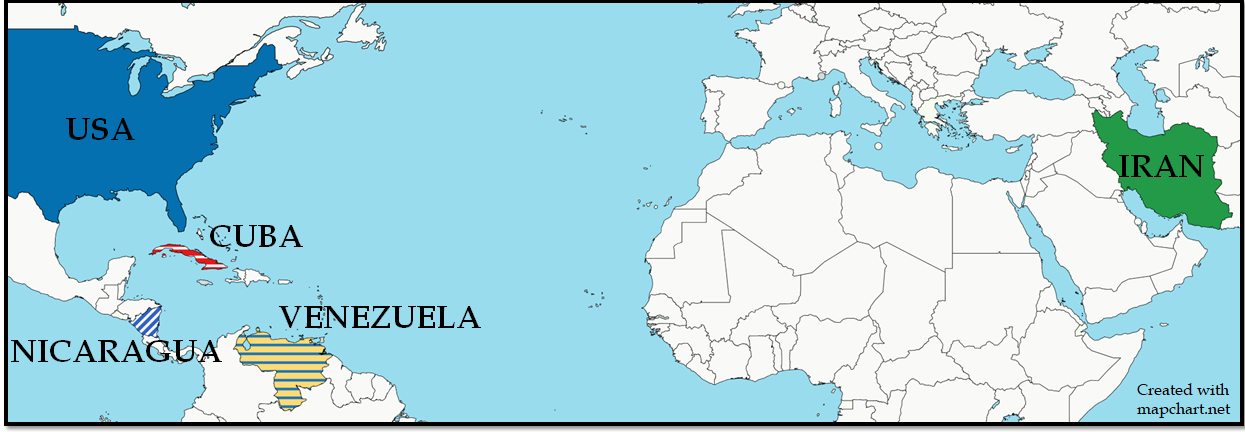
At each stop, Raisi harangued the United States and campaigned for collaboration to offset American pressure. “Sanctions are a type of war against countries, but the weapon has changed. Yesterday it was a military weapon, and today it is a sanctions weapon,” he said on Telesur. “Sanctions seek to break the people. So we have to increase relations between sanctioned countries, which counteracts and neutralizes sanctions.
The common issue for all four nations is sovereignty, Raisi said. “Americans don't want us to be independent” in production, export, or trade, he told Telesur. “Our war is actually a war of wills, a war between nations that want to live independently and a dominant system that wants nations … to be under its supervision and control. We believe that independent nations will win.”
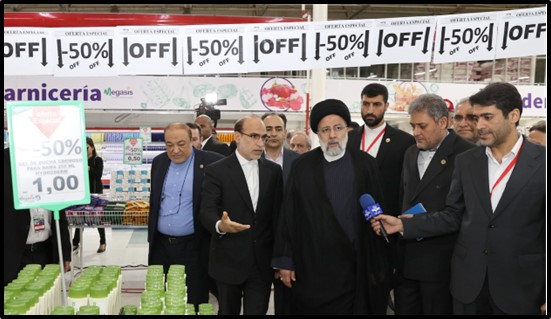
Raisi’s trip reflected Iran’s diplomatic push to widen its reach and deepen its alliances. Iran has had few allies or trading partners since the United States withdrew from the 2015 nuclear deal and reimposed sweeping economic sanctions in 2018. By 2023, Tehran was increasingly isolated due to its nuclear advances, arming Russia for the war in Ukraine, and crackdown on domestic protests.
Iran has campaigned to offset the impact of sanctions by shoring up ties with a short roster of partners. In 2023, Raisi visited China – Iran’s top trade partner for a decade – as well as Syria and Indonesia. Iran also restored diplomatic relations with rival Saudi Arabia and improved frayed ties with other Gulf states, part of its broader campaign to end its isolation and pariah status in the world. The following is a rundown on Raisi’s three stops in Latin America.
Venezuela
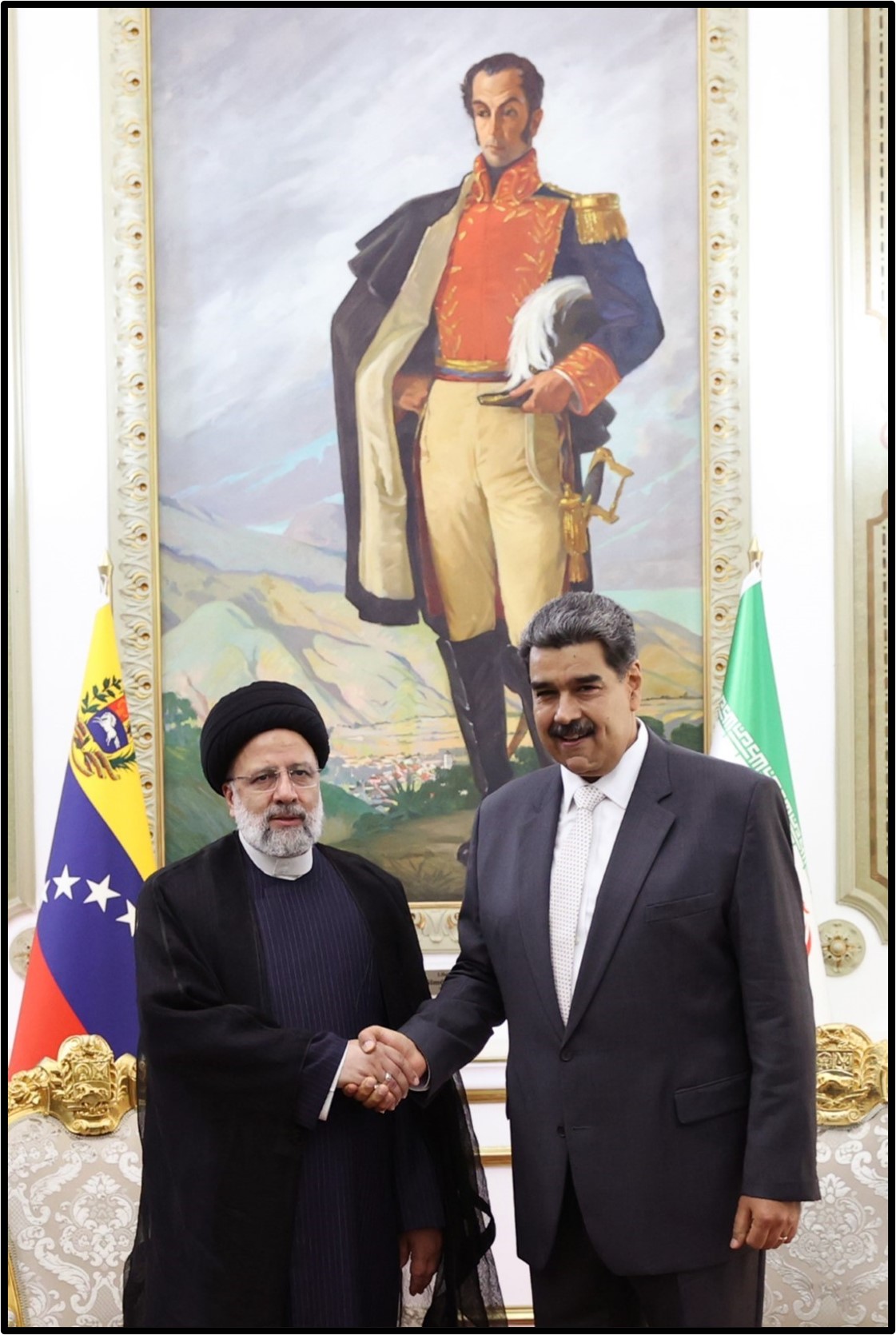
Raisi arrived in Venezuela with Iran’s ministers of foreign affairs, oil, defense, and health on June 12. At a press conference with President Nicolas Maduro, he said the two nations share “common interests, common visions, and common enemies. The relationship between Iran and Venezuela is not just a normal diplomatic relationship, but a strategic relationship.”
During a meeting with leading members of the Venezuelan National Assembly, the president blasted tough U.S. sanctions imposed on both Iran and Venezuela. “We must turn sanctions and pressures into opportunities for progress,” he urged. “This movement has started in Iran and in the last two years good steps have been taken in this direction and these experiences can be used in Venezuela as well.”
Raisi also proposed closer cooperation between the two nations in a speech to Venezuelan students and elites. “The people of Iran will stand by the people of Venezuela, and we will shake the hands of those who want global justice, and we will stand until the establishment of a new and just world order.”
Venezuela has become a strategic partner to Iran on military and economic issues. It also has geographic importance. “Venezuela is the gateway to Iran's business activities in Latin America and the Caribbean," Iranian Foreign Minister Hossein Amir-Abdollahian told Iranian news outlets.
The two leaders signed 19 bilateral agreements on communications and information technology, energy, maritime transport, higher education, agriculture, medicine, cultural exchanges and mineral cooperation. The agreements reportedly included a petrochemical deal between Venezuelan state-owned Pequiven and Iran’s state-owned petrochemical company.
At a joint press conference, Raisi predicted that the volume of trade between Iran and Venezuela would increase to $10 billion and eventually to $20 billion. He met Venezuela businessmen and made several promotional stops to encourage economic cooperation. He stressed the need for “more active shipping lines between the two countries, expanding cooperation in industrial, mining, energy and monetary and banking issues.”
The Iranian leader, a former judiciary chief who was elected in 2021, visited Magasis, an Iranian store that opened in Caracas in August 2019. He attended a science and technology exhibition of Iranian advances and toured the production lines of two Iranian auto manufacturers—Saipa and Tractor Sazi -- in Caracas. Saipa signed a new memorandum of understanding with Venezuelan Industry Ministry's authorities to deliver the first batch of 2,000 cars within a few months. Raisi also talked to Islamic organizations in Managua.
Nicaragua
On June 13, Raisi flew to Nicaragua, where he again had blistering language about the United States. He expressed solidarity with the Sandinista government. “The revolutions of the two countries had strong roots in the struggle against the domination of the rulers, especially the United States, which always sought to impose its will on others,” he said at a welcoming ceremony.
He framed relations between Nicaragua and Iran as “revolutions [with] strong roots in the struggle against the domination of the rulers, especially the United States, which always sought to impose its will on others.” In a joint press conference with President Daniel Ortega, Raisi said, “Cooperation between Latin American countries and other independent countries in different regions can create an alliance that both neutralizes sanctions and increases the capacity of independent countries.”
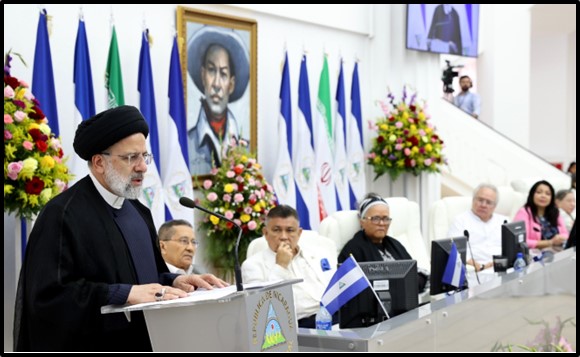
In an address to National Assembly, the Iranian president said the historical experience of both nations was “standing up to the people's vote, confronting the enemy's conspiracy and trying to realize democracy.” Tehran and Managua should “ask why the false claimants of human rights, freedom and democracy like America and some western countries don't tolerate the vote of real nations, including in Palestine, Lebanon, Afghanistan, Iraq, Syria and Latin America?"
Raisi declared that the current world order is changing. “The indicators show that the power of the dictators and America is declining and the will of the nations in Latin America and West Asia is rising.” Raisi often paid tribute to Nicaragua’s revolutionaries, another implicit dig at the United States. He visited the monument for the Sandinista revolutionaries in Managua. Raisi and Ortega signed three cooperation agreements on economic cooperation, trade, and medical supplies.
Cuba
Raisi’s final stop was in Cuba on June 15. The theme, again, was developing deeper ties to counter U.S. influence. At the welcoming ceremony, Cuban president Miguel Diaz-Canel said, “Venezuela, Nicaragua, Cuba and Iran are among the countries that have had to heroically confront sanctions, threats, blockades and interference by Yankee imperialism and its allies with a tenacious resistance."
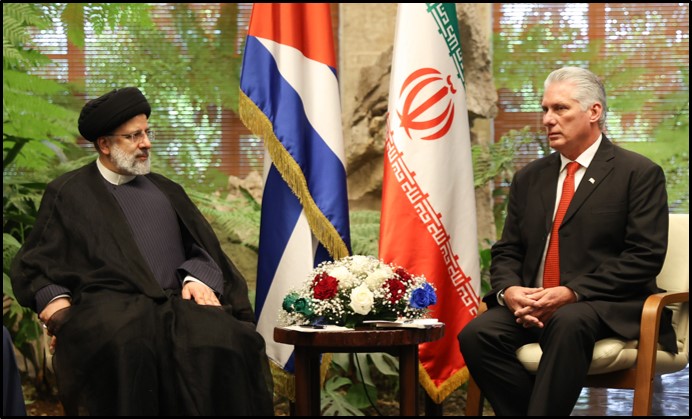
“The conditions and circumstances in which Cuba and Iran find themselves today have many things in common,” Raisi told the Cuban leader. “Every day our relations grow stronger.” The two leaders signed six cooperation agreements, including on “comprehensive political cooperation” and information technology. Raisi sought to strengthen economic ties at a meeting of Iranian and Cuban businessmen.
Senior officials from both nations and Cuba formed a working group on technological cooperation to share Iran’s expertise in nanotechnology and Cuba’s expertise on biotechnology. Raisi visited the Center for Genetic Engineering and Biotechnology in Havana, the manufacturers of the Abdala COVID vaccine made available in Latin America, and the production line of Cuba’s Central Vaccine Manufacturing Factory. His final stop was to pay respects to Cuba’s former president Raul Castro.
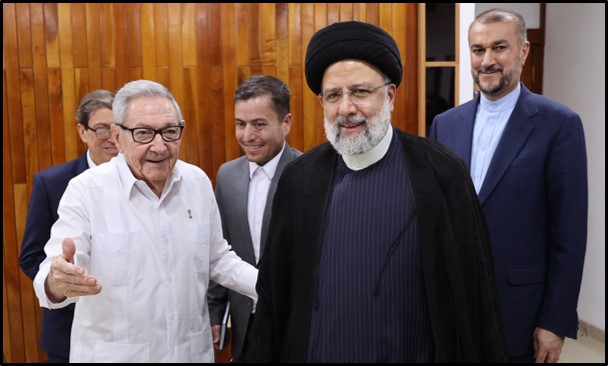
Photo Credits: Raisi at a grocery store via president.ir, Raisi and Maduro via president.ir, Raisi at the Nicaraguan National Assembly via president.ir, Raisi and Diaz-Canel via president.ir, Raisi and Castro via president.ir
